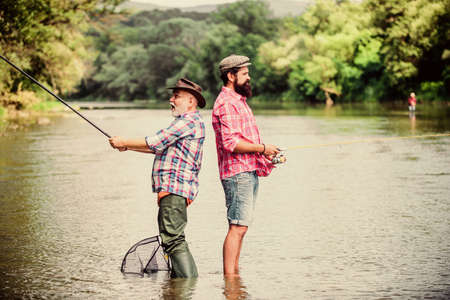Introduction to Sustainable Angling in the UK
Amidst the gentle murmur of flowing rivers and the tranquil shimmer of ancient lakes, British campers find themselves irresistibly drawn to the time-honoured pastime of angling. The UKs waterways are woven into the very fabric of its countryside, offering both solace and adventure to those who seek them out. Yet, as our appreciation for these precious blue spaces deepens, so too does our responsibility to safeguard their delicate ecosystems. Sustainable angling is more than a trend—it is an ethos that ensures these habitats remain vibrant for generations of campers and wildlife alike. By embracing eco-friendly fishing practices, campers can enjoy the simple pleasure of casting a line while nurturing the natural beauty that makes the British outdoors so captivating.
Understanding Local Regulations and Seasonal Guidelines
Fishing in the UK is a cherished pastime, threaded with traditions and respect for nature. Before casting your line, it’s essential to acquaint yourself with local angling laws and seasonal guidelines. The UKs waters are governed by strict regulations designed to protect fish populations and delicate aquatic ecosystems, so responsible campers must navigate these rules with care and mindfulness.
Respecting British Angling Laws
The rules can vary widely depending on where you intend to fish—whether it’s a tranquil Scottish loch, an English riverbank, or a Welsh reservoir. Across the UK, anglers are generally required to hold a valid rod fishing licence for freshwater species such as trout, salmon, and coarse fish. In England and Wales, this licence is issued by the Environment Agency, while in Scotland and Northern Ireland different authorities oversee licencing.
Obtaining the Right Permits
| Region | Main Authority | Licence Required? | Notable Considerations |
|---|---|---|---|
| England & Wales | Environment Agency | Yes | Separate permits may be needed for private waters or specific clubs. |
| Scotland | District Salmon Fishery Boards / Landowners | Varies by waterbody | No centralised licence for coarse fishing; permits from landowners often required. |
| Northern Ireland | Department of Agriculture, Environment and Rural Affairs (DAERA) | Yes | Additional club or fishery permits might be necessary. |
Closed Seasons and Conservation Efforts
The concept of closed seasons is pivotal in UK angling culture. These designated periods—often varying by region and species—allow fish to spawn undisturbed, nurturing future generations. For example, coarse fishing on rivers in England typically closes from mid-March to mid-June. Respecting these intervals not only upholds the law but also honours the rhythms of British wildlife. Always check local bylaws before planning your trip, as ignorance is no excuse in the eyes of both rangers and fellow anglers.
Treading lightly along riverbanks and lakeshores means staying attuned to these legal frameworks, ensuring your time in nature leaves only gentle ripples behind.
![]()
3. Leave No Trace: Protecting Britain’s Natural Beauty
As campers and anglers in the UK, we are fortunate to explore landscapes woven with wild rivers, tranquil lochs, and emerald banks fringed with ancient willows. Yet, this privilege comes with a gentle responsibility—to leave each place as pristine as when we arrived. Practising Leave No Trace is more than a guideline; it is an act of respect for the unique natural heritage of Britain.
Mindful Waste Disposal
Start by taking all litter home—including fishing lines, hooks, bait containers, and even biodegradable waste. Local wildlife, from curious otters to shy water voles, can be endangered by discarded gear or food scraps. In rural Britain, bins are rare near fishing spots, so bring sturdy bags to carry your rubbish out. When wild camping, dig small holes for organic waste at least 50 metres from water sources—this preserves water quality for everyone downstream.
Protecting Riverbanks and Loch Shores
Riverbanks and loch shores in the UK are delicate ecosystems where reeds shelter nesting birds and roots knit the soil together. Tread lightly on these banks: avoid trampling vegetation and never widen paths or create new ones. Set up camp on durable ground like gravel or established clearings rather than soft moss or heather. If you move stones or logs while fishing, replace them carefully—they may be homes for insects and amphibians vital to local biodiversity.
Preserving Tranquillity
Sound travels far over still water. Keep noise low to let the magic of dawn mist or dusk’s golden hush settle undisturbed over the water. The quiet not only respects fellow anglers but also lets wildlife thrive in peace—a simple courtesy that embodies British countryside manners.
By following these mindful habits, you become part of a tradition that cherishes nature’s beauty for generations to come. Each thoughtful choice—every bit of rubbish removed, every bank left untouched—helps safeguard the wild heart of Britain’s waterscapes.
4. Choosing Eco-Friendly Fishing Gear
When camping and fishing in the UK’s rolling landscapes, choosing the right equipment is as vital to the environment as it is to your angling experience. British anglers have long traditions of respecting local waters, and today, this respect extends to making sustainable choices that preserve our rivers, lakes, and lochs for future generations. By opting for eco-friendly gear, campers can marry age-old customs with contemporary innovations.
Biodegradable Lines: Gentle on Nature
Standard fishing lines can linger in water for years, posing a risk to wildlife. Biodegradable alternatives, now widely available in the UK, break down naturally over time without leaving harmful residues. These lines are crafted to match traditional strength but dissolve safely, making them an excellent choice for eco-conscious anglers who wish to tread lightly.
Lead-Free Weights: Protecting Aquatic Life
The use of lead weights has been a point of concern due to their toxicity to aquatic life. Fortunately, UK manufacturers offer a range of lead-free options such as tin, tungsten, and steel. These materials align with local regulations and heritage, ensuring your kit reflects both innovation and tradition.
Comparison of Sustainable Kit Choices
| Gear Type | Sustainable Option | UK Tradition/Innovation |
|---|---|---|
| Fishing Line | Biodegradable monofilament | Combines classic casting feel with modern eco-designs |
| Weights | Tin or tungsten sinkers | Adheres to UK lead ban; echoes historical non-lead solutions |
| Lures & Flies | Hand-tied natural fibres or recycled plastics | Cottage industry craftsmanship meets sustainability |
| Nets & Traps | Bamboo frames, organic cotton mesh | Traditional materials revived for green camping trips |
Local Sourcing and DIY Spirit
Supporting local tackle shops not only boosts community economies but also gives access to region-specific advice on sustainable gear. Many British anglers also cherish the practice of crafting their own flies or repairing old rods—an approach rooted in thriftiness and environmental respect. By blending these time-honoured habits with new eco-friendly materials, your fishing adventure becomes a celebration of both past and present stewardship.
5. Best Practices: Catch and Release in British Waters
Casting your line into the cool hush of a British loch or winding river is an experience steeped in quiet tradition and natural beauty. For campers who cherish both their catch and the delicate balance of these wild places, embracing responsible catch and release methods is paramount. Across the UK’s varied habitats—from the chalk streams of Hampshire to the rugged Scottish Highlands—gentle handling and knowledge of local fish species are essential for preserving aquatic life.
Gentle Handling: Respecting Every Catch
When practising catch and release, every motion matters. Wet your hands before touching any fish to protect their sensitive mucous coating, which guards against disease. Use barbless hooks where possible, as they minimise injury and make unhooking swifter and less stressful for the fish. Never squeeze or hold a fish vertically; instead, cradle it horizontally with both hands, allowing it to remain calm and dignified in your care.
Knowing Your Local Species
The UK’s waters brim with iconic native species such as brown trout, Atlantic salmon, grayling, and coarse fish like chub and dace. Each has unique needs—wild trout, for example, are particularly sensitive to warm water temperatures and low oxygen levels. Learning about these distinctions enables anglers to adapt their techniques accordingly, such as limiting fishing during spawning times or periods of environmental stress.
Boosting Survival Rates: Thoughtful Techniques
To give released fish the best chance of survival, avoid removing them from the water whenever possible. Gently support them facing upstream until they swim away on their own, ensuring they have regained strength. Use only single hooks rather than trebles to further reduce damage. On hot days or when rivers run low, consider taking a break from fishing altogether—a gesture that speaks volumes for your respect towards Britain’s precious waterways.
By weaving these eco-friendly practices into your camping and angling routine, you become part of a living legacy—one where each gentle release under dappled sunlight helps guarantee that future generations can share in the wild poetry of British waters.
6. Supporting Local Conservation Efforts
Camping and fishing along the UK’s waterways is a privilege that comes with an important responsibility: to nurture and protect these cherished environments for generations to come. There are many ways for campers and anglers to become active stewards of Britain’s rivers, lakes, and reservoirs, ensuring their beauty and vitality endure.
Get Involved in Community Projects
One of the most rewarding ways to support eco-friendly fishing is by joining local conservation groups or volunteering for habitat restoration days. Many organisations across the UK, such as The Rivers Trust and local Wildlife Trusts, organise river clean-ups, tree planting events, and educational workshops. These hands-on experiences not only make a tangible difference but also connect you with like-minded individuals who share a passion for preserving nature’s wonders.
Support Local Fisheries
When planning your next angling adventure, choose fisheries that champion sustainable practices. Look for venues that invest in native fish stocking, maintain healthy aquatic vegetation, and prioritise water quality. By purchasing your permits from these responsible operators or supporting tackle shops with eco-conscious values, you help sustain ethical businesses that value both the sport and the environment.
Advocate for British Waterways
Your voice matters. Participate in local forums or online communities focused on river conservation. Engage with councils and environmental bodies when public consultations arise about water management or access rights. Share your knowledge with fellow campers—whether it’s explaining why lead-free tackle is essential or encouraging catch-and-release where appropriate. Collective advocacy can shape policies that safeguard our natural heritage.
Leave No Trace
Set an example for others by practising ‘leave no trace’ principles at every campsite and fishing spot. Always take litter home—including discarded line or bait packaging—and if you find rubbish left behind by others, consider picking it up as a small act of kindness towards the landscape.
Inspiring Future Stewards
If you’re camping with family or friends, especially children, involve them in conservation activities. Teach them about the delicate balance of aquatic ecosystems and the importance of respecting wildlife. Through shared experiences, we foster a culture of care and appreciation for Britain’s beloved waterways—ensuring they remain havens of tranquillity and life for all who visit.


